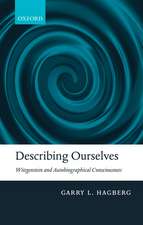Enduring Time
Autor Lisa Baraitseren Limba Engleză Paperback – 29 noi 2017
| Toate formatele și edițiile | Preț | Express |
|---|---|---|
| Paperback (1) | 167.71 lei 3-5 săpt. | |
| Bloomsbury Publishing – 29 noi 2017 | 167.71 lei 3-5 săpt. | |
| Hardback (1) | 539.64 lei 6-8 săpt. | |
| Bloomsbury Publishing – 29 noi 2017 | 539.64 lei 6-8 săpt. |
Preț: 167.71 lei
Preț vechi: 216.44 lei
-23% Nou
Puncte Express: 252
Preț estimativ în valută:
32.09€ • 33.47$ • 26.67£
32.09€ • 33.47$ • 26.67£
Carte disponibilă
Livrare economică 28 februarie-14 martie
Preluare comenzi: 021 569.72.76
Specificații
ISBN-13: 9781350008113
ISBN-10: 1350008117
Pagini: 232
Dimensiuni: 156 x 234 mm
Greutate: 0.43 kg
Editura: Bloomsbury Publishing
Colecția Bloomsbury Academic
Locul publicării:London, United Kingdom
ISBN-10: 1350008117
Pagini: 232
Dimensiuni: 156 x 234 mm
Greutate: 0.43 kg
Editura: Bloomsbury Publishing
Colecția Bloomsbury Academic
Locul publicării:London, United Kingdom
Caracteristici
The book not only offers a brilliantly original philosophy of time, it provides a detailed overview of contemporary theories of time which will be indispensable to students working in this area
Notă biografică
Lisa Baraitser is Professor of Psychosocial Studies, in the Department of Psychosocial Studies, Birkbeck, University of London, UK and the author of Maternal Encounters (2008).
Cuprins
prefaceacknowledgements1. Introduction: On the survival of obdurate temporalities in late liberalism2. Maintaining: On time, attachment and care3. Waiting: On psychoanalytic time, generation and protest4. Repeating: On stilled time, maternal time and the non-reproductive 5. Enduring: On chronophobia, incarcerated time and a politics of hopefulness6. Recalling: Late Memory: on time and older age7. Staying: On anachronism, out-datedness, and the case of 'psychic reality'8. Delaying: On time's withdrawal and the surpassing disaster 9. Conclusion: Time without project and the time that we havebibliographyindex
Recenzii
The remit of Enduring Time is generous and expansive, implicating a seemingly limitless range of temporal tropes: delaying, waiting, repeating, persisting. But Baraitser offers not merely a philosophical rumination on time's suspension, but also an intervention that seeks to create, however partially, conditions for political action, too.
This original and comprehensive book is an insightful and valuable source for artists, activists, students, and academics working on (maternal) time, temporality, and care.
Enduring Time is an extended meditation on the often-despised forms of time both revealed in and required by the practices of care that 'take' time. Baraitser shows us how to think and revalue the forms of time's suspension experienced in and through maintenance, grief, waiting . to see what endures. A beautiful and profound book that calls us to notice what might otherwise be missed or dismissed, it brings to the fore the multiform labours underpinning the maintenance of existence by theorising the temporal underbelly of 'our times'. Baraitser shows us what, in our haste, we often can't see: the ways time doesn't 'pass', and how, in that stuck time, the question of care surfaces.
Baraitser: "brilliant and capacious"A prodigious and capacious work that offers a complex and surprising reflection on time and, along the way, a new theoretical foundation for psychosocial studies. Drawing on a wide range of cultural and theoretical accounts of time, its multiple forms, Baraitser give us a new way of thinking about a time that does not move, one that remains, fraught with the anachronistic and the "useless" as minor paths toward affirmation. This book releases "maintenance" from the shadows of disavowed social life. The time at issue here is one that conforms neither to project nor to progress, but slowly and insistently returns our attention to the repetitive practices that make life with and for others. The "useless" comes to characterize as well modes of thinking that seek value, even reparation, in the time that remain, in the wake of destruction, but also in the face of closing horizons.This work is actually a tour de force, even though it prizes work that does not always gain a monumental status in the public eye. It constitutes the most significant rethinking of "women's time" since Kristeva's influential article. It produces an alliance between maternal and queer thinking through recourse to the pervasive character of the "unproductive" - the work is as provocative as it is persuasive. In other words, it changes multiple frameworks at once, finding and asserting the value of "not moving on" as it links to both the ethical and aesthetic potentials of our enduring ties with others. Finally, it brings philosophy, psychoanalysis, cultural theory, feminism and race theory, art and art criticism, together with trenchant social critique, philosophical meditation, and psychoanalytic inquiry in a brilliant and capacious way. Without any recourse to essentialism, Baraitser shows us for the first time the temporal world of care, of maintenance, their nonproductive and nonteleological potentials in an ethics that illuminates our world as one of time-consuming practices of staying with and for one another in the midst of destruction and repair.
This original and comprehensive book is an insightful and valuable source for artists, activists, students, and academics working on (maternal) time, temporality, and care.
Enduring Time is an extended meditation on the often-despised forms of time both revealed in and required by the practices of care that 'take' time. Baraitser shows us how to think and revalue the forms of time's suspension experienced in and through maintenance, grief, waiting . to see what endures. A beautiful and profound book that calls us to notice what might otherwise be missed or dismissed, it brings to the fore the multiform labours underpinning the maintenance of existence by theorising the temporal underbelly of 'our times'. Baraitser shows us what, in our haste, we often can't see: the ways time doesn't 'pass', and how, in that stuck time, the question of care surfaces.
Baraitser: "brilliant and capacious"A prodigious and capacious work that offers a complex and surprising reflection on time and, along the way, a new theoretical foundation for psychosocial studies. Drawing on a wide range of cultural and theoretical accounts of time, its multiple forms, Baraitser give us a new way of thinking about a time that does not move, one that remains, fraught with the anachronistic and the "useless" as minor paths toward affirmation. This book releases "maintenance" from the shadows of disavowed social life. The time at issue here is one that conforms neither to project nor to progress, but slowly and insistently returns our attention to the repetitive practices that make life with and for others. The "useless" comes to characterize as well modes of thinking that seek value, even reparation, in the time that remain, in the wake of destruction, but also in the face of closing horizons.This work is actually a tour de force, even though it prizes work that does not always gain a monumental status in the public eye. It constitutes the most significant rethinking of "women's time" since Kristeva's influential article. It produces an alliance between maternal and queer thinking through recourse to the pervasive character of the "unproductive" - the work is as provocative as it is persuasive. In other words, it changes multiple frameworks at once, finding and asserting the value of "not moving on" as it links to both the ethical and aesthetic potentials of our enduring ties with others. Finally, it brings philosophy, psychoanalysis, cultural theory, feminism and race theory, art and art criticism, together with trenchant social critique, philosophical meditation, and psychoanalytic inquiry in a brilliant and capacious way. Without any recourse to essentialism, Baraitser shows us for the first time the temporal world of care, of maintenance, their nonproductive and nonteleological potentials in an ethics that illuminates our world as one of time-consuming practices of staying with and for one another in the midst of destruction and repair.


















